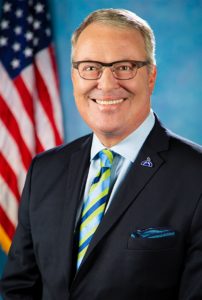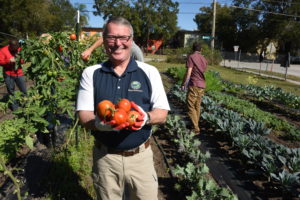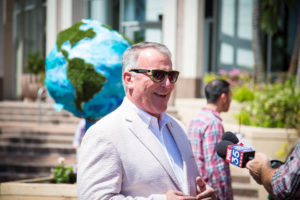 Orlando Mayor Buddy Dyer
Orlando Mayor Buddy Dyer
Climate Mayors Steering Committee member
The last year has been extraordinarily challenging. In the face of a global pandemic, a seismic economic downturn, a reckoning with racial injustice, and the ongoing threat of climate change, cities across the country are under enormous pressure. Throughout this time Climate Mayors have called for a “green and equitable recovery,” issuing a letter to Congress in July and launching a National Dialogue series that same month, the first event of which focused on the Southeast. The message has been straightforward – cities are committed to taking ambitious action on climate change, but they need a constructive federal partner to fully realize and expand their efforts.
That partner now exists in the White House. Since taking office, President Biden has returned the United States to the Paris Agreement, and has issued a series of executive orders articulating his whole-of-government approach, one grounded in equity and sustainability. I can remember when the Climate Mayors network began in 2014, as we were organizing for COP21 and the Paris Climate Agreement, and it’s truly amazing to see over 470 cities actively demonstrating climate leadership and advancing solutions in our cities today. Climate Mayors is in an incredible position to partner with the new Administration, and drive ambitious, equitable climate solutions at the local, state, national, and international levels.
The City of Orlando started our sustainability journey almost 15 years ago by launching our Green Works Orlando initiative in 2007, which has now evolved into a permanent Office of Sustainability and Resilience. Since the launch of Green Works, our strategy has focused heavily on decreasing carbon emissions by reducing energy use in buildings through energy-efficiency policies and programs; ramping up renewable energy, including utility-scale solar farms, rooftop solar projects, and floating solar on our retention ponds; improving public transit and micromobility through bus rapid transit (BRT), commuter trains, and a network of bike and scooter trails; and electrifying our municipal fleets and buses, and enabling EVs for consumers and visitors.
Through these interventions, Orlando has seen a 19-percent reduction in our GHG emissions from 2007 levels – and almost double from a per capita standpoint – while continuing to grow our economy in a steady way. But our work has only begun, and the next decade of action will be essential to achieving our community goals.
Last year, during the most disruptive crisis in modern history with COVID-19, we decided to continue with, and to double-down on, our commitment to sustainability and climate action. We believe the health of our environment, our community, and our economy are intrinsically linked. And we know that our sustainability programs are getting us closer to a future that is healthier, more prosperous, and more resilient to future shocks.
With that in mind, we have kept our ambitious agenda moving forward by installing four new rooftop solar projects on fire stations to enhance resilience and reduce operational expenses; implementing a new Green Building Incentive Program to encourage new development to build healthier, greener buildings for the community; expanding the number of new Level 2 EV charging stations to city parks, neighborhood centers, and parking facilities; unveiling our first fleet of zero-emission electric buses in our downtown, with 14 that will be in operation by the end of the year; and becoming a recognized LEED Gold City by the USGBC.
From a climate perspective, I’m proud of the commitments of our municipal electric and water utility, the Orlando Utility Commission (OUC), who finished an 18-month integrated resources plan to forecast the future of Orlando’s electric grid. After considerable community and stakeholder engagement, as well as alignment with the City’s climate goals, the OUC unanimously approved a plan to reach net-zero carbon without offsets by 2050, with intermediate targets of 50 percent by 2030 and 75 percent by 2040; retire the last two coal plants by 2027 – earlier than originally planned – with considerable reduction of coal in 2025; and commit to strictly solar, energy storage, and energy efficiency from now to 2050.
Lastly, I think it’s important that we realize that the global pandemic has hit communities of color and low-income families the hardest – the same residents and neighborhoods who suffer most from the effects of climate change, including dangerous emissions, energy burdens, skyrocketing temperatures, and extreme weather events like hurricanes. Last month, in an effort to address these disparities, I appointed the City’s first Equity Official to support us in our journey to ensure that as we advance sustainability and climate solutions, we do so in a way that focuses on equity and inclusion.
We’ve made great progress to date but have much more work to do. I’m proud that the Climate Mayors are determined to build a strong, green, and equitable economy that ensures all Americans are prepared for future health, economic, and environmental shocks.


